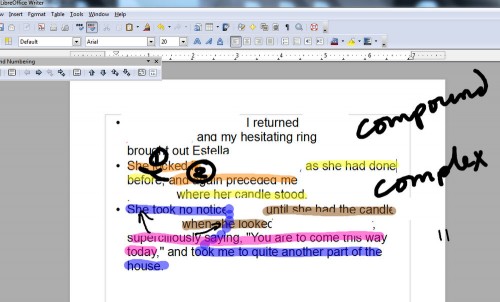It’s the end of the year, which means the English I students are tackling Great Expectations, having just finished a brief overview/review of clauses and sentence types. “To understand Dickens,” I explained a couple of weeks ago, “you have to break apart some of his incredibly complex sentences into manageable chunks.” So we practice: every day, students entering class are greeted by a few sentences of from the previous evening’s readings. The bell-ringer, starter, whatever you want to call it:
At the appointed time I returned to Miss Havisham’s, and my hesitating ring at the gate brought out Estella. She locked it after admitting me, as she had done before, and again preceded me into the dark passage where her candle stood. She took no notice of me until she had the candle in her hand, when she looked over her shoulder, superciliously saying, “You are to come this way today,” and took me to quite another part of the house.
Students cross out unnecessary phrases — prepositional, gerund, participial — and try to find the gold: a single subordinate clause. “If you find a subordinate clause,” I explain, “you know it’s either a complex or compound-complex sentence; if you don’t, you know it’s a simple or compound sentence.”

The results are improving daily.
0 Comments